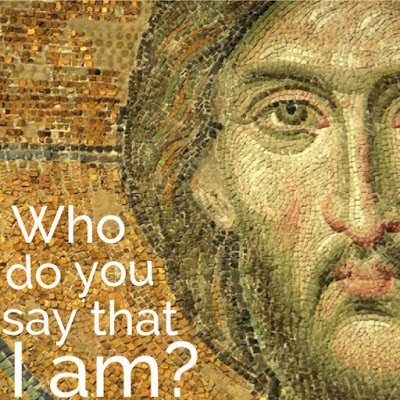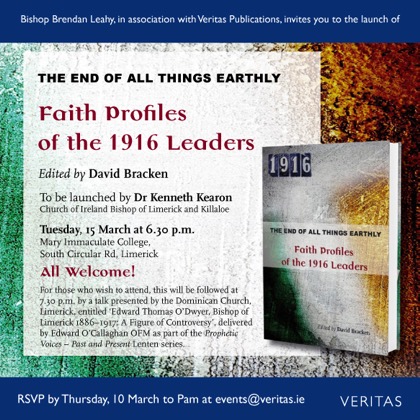You can listen to the podcast of this weeks full programme HERE.
The World of Edward Thomas O'Dwyer of Limerick (1886-1917)
Limerick Diocesan archivist David Bracken joins John and Shane this week to share some of the story of Edward O'Dwyer the former bishop of Limerick who died in 1917.
Born at Holy Cross, Co. Tipperary, Edward Thomas O'Dwyer was educated at the C.B.S. in Limerick and at St. Patrick’s College, Maynooth, where he was ordained in June 1867. Having served as CC in Rathkeale, Bruff, St. Patrick’s Adare, Newcastle West and St. Michael’s, he was appointed bishop in May 1886. One of the most famous Irish bishops of the late nineteenth century, he was also one of the most controversial. Honoured by Pope Leo XIII for his part against the Plan of Campaign, he ended his life with approval from his people for his stand against General Maxwell in the wake of the 1916 Rising.
General Maxwell wrote to various Bishops directing them to remove suspect priests from the active ministry. But he picked the wrong man in Bishop O’Dwyer when he named two priests in his Diocese who had preached against the dangers of conscription and whom the general regarded as being a dangerous menace to the peace and safety of the realm. Bishop O'Dwyers response was published and gained him national and international renown.
Bishop O'Dwyer's letter to Maxwell
Sir,
I beg to acknowledge receipt of your letter of 12st instant which has been forwarded to me here.
I have read carefully you allegations against Rev. and Rev. but do not see in them any justification for disciplinary action on my part. They are both excellent priests, who hold strong national views, but I do not know that they have violated any law civil or ecclesiastical.
In your letter of the 6th instant you appealed to me to help you in the furtherance of your work as a military dictator of Ireland. Even if action of that kind was not outside my province, the events of the past few weeks would make it impossible for me to have any part in proceedings which I regard as wantonly cruel and oppressive.
You remember the Jameson raid, when a number of buccaneers invaded a friendly state and fought the forces of the lawful government. If ever men deserved the supreme punishment it was they, but officially and unofficially, the influence of the British government was used to save them and it succeeded. You took care that no plea for mercy should interpose on behalf of the poor young fellows who surrendered to you in Dublin. The first information which we got of their fate was the announcement that they had been shot in cold blood.
Personally, I regard your action with horror, and I believe that it has outraged the conscience of the country. Then the deporting of hundreds and even thousands of poor fellows without a trial of any kind seems to me an abuse of power as fatuous as it is arbitrary and your regime has been one of the worst and blackest chapters in the history of misgovernment of the country.
I have the honour to be Sir your obedient servant.
Edward Thomas, Bishop of Limerick
To General Sir J.G Maxwell,To mark the centenary of his death and his complex role in the life of Limerick, the church in Ireland and also internationally during WWI, then and down to the present day through his founding of Mary Immaculate College, St Munchin's College and St John's Hospital in Limerick there is a conference hosted by the Department of History, Mary Immaculate College & the Limerick Diocesan Archives being held on 13th October 2017.
Commander-in-Chief, the forces in Ireland
The programme includes:
- Dr Colin Barr (University of Aberdeen), ‘Cullen’s heir?’
- Dr Úna Ní Bhroiméil (Mary Immaculate College), ‘”The ablest educationist of the Irish Episcopate”: Bishop E.T. O’Dwyer and Catholic control of primary education.
- Dr Sarah Roddy (University of Manchester) , ‘The bishop as financial manager: Limerick under Edward O’Dwyer’
- Dr Jacinta Prunty (Maynooth University), ‘Networks and news: the correspondence of Annie O’Dwyer with her brother Bishop Edward Thomas’
- Dr Brian Murphy O.S.B. (Glenstal Abbey), ‘Bishop O’Dwyer and the 1916 Rising: “I trust in valour not in arms”’
- Dr Jérôme aan de Wiel (University College Cork), ‘Bishop O’Dwyer, Mgr O’Riordan, Benedict XV and Irish-Vatican relations during the First World War’
An online database of published material about Bishop O'Dwyer including all of his Lenten pastoral letters including his famous 1915 letter about WWI are available from Limerick City Library available online HERE.
A defiant bishop – An Irishman’s Diary on Edward O’Dwyer, Limerick and 1916 - The Irish Times 16th May 2016
Gospel Matthew 16:13-20
Jesus went into the region of Caesarea Philippi andhe asked his disciples,"Who do people say that the Son of Man is?" They replied, "Some say John the Baptist, others Elijah,still others Jeremiah or one of the prophets." He said to them, "But who do you say that I am?" Simon Peter said in reply,"You are the Christ, the Son of the living God." Jesus said to him in reply,"Blessed are you, Simon son of Jonah. For flesh and blood has not revealed this to you, but my heavenly Father. And so I say to you, you are Peter,and upon this rock I will build my church,and the gates of the netherworld shall not prevail against it. I will give you the keys to the kingdom of heaven. Whatever you bind on earth shall be bound in heaven;and whatever you loose on earth shall be loosed in heaven." Then he strictly ordered his disciplesto tell no one that he was the Christ.
Reflections on this weeks gospel:
Word on Fire
English Dominicans
Sunday Reflections
Centre for Liturgy
Liturgical odds & ends
Liturgy of the Hours - Psalter week 1; 21st week in Ordinary time
Saints of the Week
August 28th - St Augustine
August 29th - Passion of St John the Baptist
August 30th - St Fiacre
August 31st - St Aidan of Lindisfarne
September 1st - St Giles (First Friday)
September 2nd - St Ingrid of Sweden(First Saturday)









